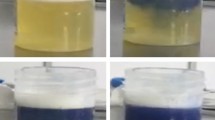Summary
The following article deals with an update of the clinical-toxicological literature of the years 1996–1998. Currently gastric lavage and induced emesis are used more restrictively. It should only be considered if a potentially life-threatening amount of poison is ingested and there was no time lack more than 60 minutes. More emphasis is put on activated charcoal therapy. Repetitive doses of charcoal seem to have advantages in case of slow release formulations, a final judgement is not yet possible.
Liver injury after poisoning with paracetamol in chronical alcohol addiction is reported in relatively low doses. Extracorporal elimination procedures can improve clinical outcome of paracetamol overdose. Liver transplantation should be considered more restrictively. Substitution of sodiumbicarbonate to enhance blood alkali level is established in the treatment of cardiac arrhythmias in tricyclic antidepressant drug overdosage. Acute toxicity of selective serotonine reuptake inhibitors is less than tricyclic antidepressants. However the combination with serotonin liberators may induce the life-threatening serotonine syndrome. Isolated fatal valproate overdosages are reported. Concerning carbamazepine intoxication therapy with charcoal hemoperfusion is well established. Poisoning with neuroleptic drugs necessitate careful monitoring because of potential malignant cardiac arrhythmias. Potent antiemetics like ondansetron may facilitate oral charcoal application in case of theophylline intoxication. Comparing clinical outcome hemodialysis is as effective as charcoal hemoperfusion to treat severe theophylline overdose. Poisoning with zolpidem shows minor toxicity in most cases. Diphenhydramine can cause severe CNS disturbances, cardiac arrhythmias and rhabdomyolysis.
Zusammenfassung
In der folgenden Arbeit wird ein update über die aktuelle klinisch toxikologische Literatur der Jahre 1996–1998 gegeben. Magenspülung und induziertes Erbrechen werden zunehmend zurückhaltender eingesetzt. Die Indikation wird auf Vergiftungen mit potentiell lebensbedrohlichen Mengen an Substanz beschränkt, wenn die Maßnahme innerhalb eines Zeitfensters von 60 Minuten durchführbar ist. In verstärktem Maße kommt die Kohle-Diarrhoe-Therapie zum Einsatz. Die repetitive Gabe von Kohle scheint bei Präparaten mit verzögert freisetzendem Wirkstoff Vorteile zu bieten, insgesamt ist die Bewertung noch uneinheitlich.
Leberschäden nach Paracetamolingestion sind bei chronischem Alkoholabusus schon nach geringeren Überdosierungen zu beobachten. Sekundäre Eliminationsverfahren können das Outcome von Paracetamolvergiftungen verbessern. Die Indikation zur Lebertransplantation sollte zurückhaltend gestellt werden. In der Therapie von Rhythmusstörungen bei Vergiftungen mit trizyklischen Antidepressiva sind bislang nur die Natriumsubstitution und die Alkalisierung des Blutes etabliert. Die akute Toxizität von selektiven Serotonin-Reuptake-Hemmern ist geringer als bei trizyklischen Antidepressiva. Die Kombination mit Serotoninliberatoren kann jedoch das lebensbedrohliche Serotoninsyndrom hervorrufen. Unter Valproinsäurevergiftungen sind Einzelfälle mit tödlichem Ausgang aufgetreten. In der Therapie der Carbamazepinvergiftung hat die Hämoperfusion einen festen Platz. Vergiftungen mit Neuroleptika zwingen wegen potentiell maligner Rhythmusstörungen zur sorgfältigen Monitorkontrolle. Potente Antiemetika wie Ondansetron können im Rahmen von Theophyllinintoxikationen die orale Kohle-Gabe ermöglichen. Hämodialyse und Hämoperfusion sind bei Vergiftungen mit Theophyllin im klinischen Outcome gleichwertig. Zolpidemvergiftungen zeigen meistens harmlose Verläufe. Diphenhydramin kann schwere ZNS-Störungen, Rhythmusstörungen und Rhabdomyolysen verursachen.
Similar content being viewed by others
Author information
Authors and Affiliations
Additional information
Eingegangen: 4. Januar 1998 Akzeptiert: 18. Januar 1999
Rights and permissions
About this article
Cite this article
Menzner, A., Weilemann, L. Akute Medikamenten-Vergiftungen – Neue Ergebnisse und Trends (1996–1998). Intensivmed 36, 5–14 (1999). https://doi.org/10.1007/s003900050203
Issue Date:
DOI: https://doi.org/10.1007/s003900050203




